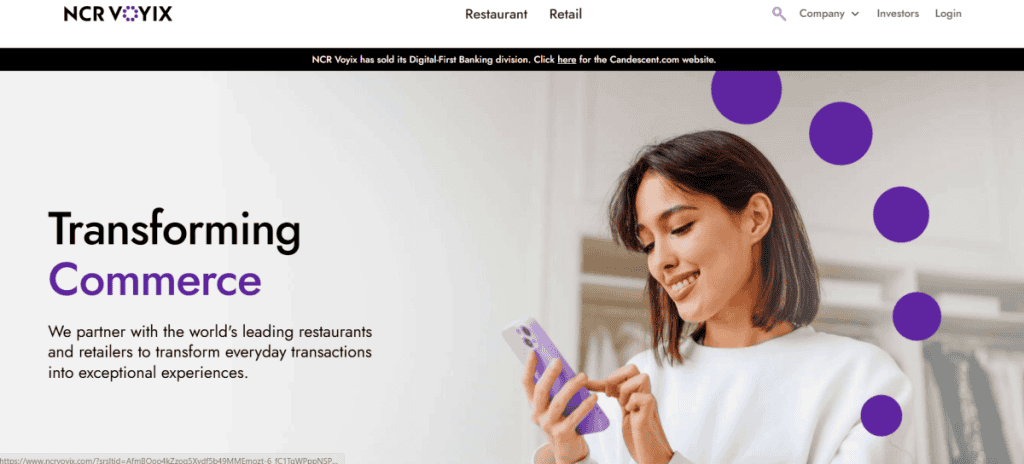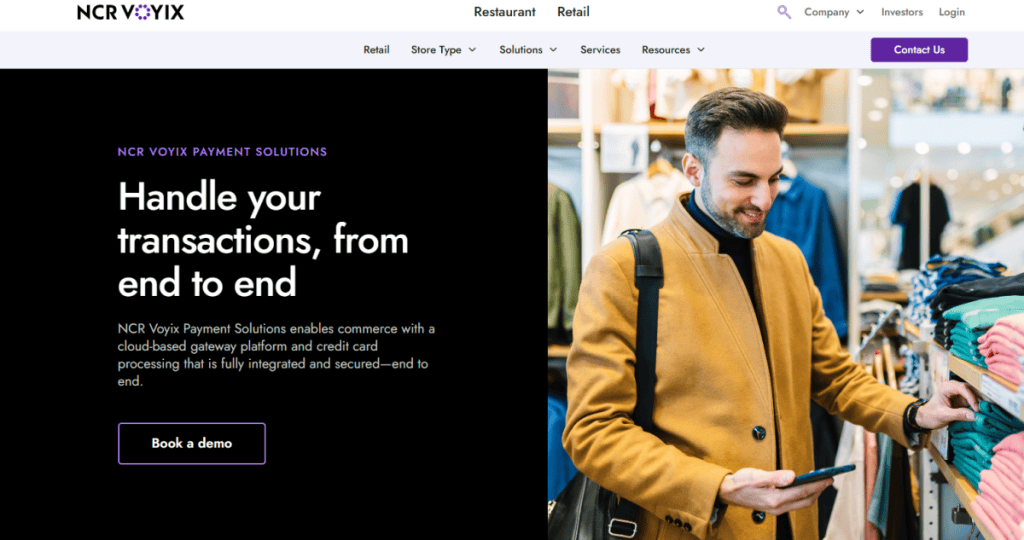
NCR Payments Review
- 31st Jan, 2025
- | By Linda Mae
- | Reviews
NCR Corporation, established in 1884 as the National Cash Register Company, boasts a rich history in financial technology and payment processing. Throughout the years, it has transformed from a maker of mechanical cash registers into a worldwide frontrunner in financial services, retail, and hospitality technology solutions. NCR has consistently emphasized innovation, broadening its product range to satisfy the increasing needs of contemporary businesses, establishing it as a prominent name in payment processing. Lets read more about NCR Payments Review.
NCR Payments is a dedicated division of NCR Corporation that provides end-to-end payment solutions for businesses across multiple industries, including retail, restaurants, and banking. Leveraging decades of expertise, NCR Payments delivers a robust suite of services, including point-of-sale systems, payment terminals, e-commerce gateways, and integrated payment processing. The division plays a crucial role in helping businesses streamline transactions, improve operational efficiency, and enhance customer experiences.
A significant advantage of NCR Payments lies in its capacity to integrate effortlessly with other NCR solutions, forming a cohesive ecosystem for businesses aiming to handle sales, inventory, and customer interaction from a unified platform. Focusing on security, compliance, and scalability, NCR Payments has established itself as a strong competitor in the market, serving both small businesses and large corporations. With the growth of digital transactions, NCR Payments’ dedication to innovation and dependability guarantees its ongoing significance in the changing financial technology environment.
Product and Service Offerings | NCR Payments Review
NCR Payments provides a comprehensive suite of payment solutions tailored to businesses across various industries, including retail, hospitality, and financial services. At its core, the company offers point-of-sale systems that integrate payment processing with business management tools. These POS solutions range from traditional countertop terminals to mobile and cloud-based systems, enabling businesses to accept payments efficiently in-store, online, or on the go.
A crucial element of NCR Payments’ system is its payment gateway, which enables safe online transactions. Tailored for online retail, the gateway accommodates multiple payment options, such as credit and debit cards, digital wallets, and contactless transactions. This allows companies to provide smooth checkout experiences while maintaining adherence to industry security regulations. Moreover, NCR Payments offers e-commerce solutions that connect with leading shopping platforms, enabling merchants to handle online and physical sales through a single system.
Beyond payment processing, NCR Payments offers value-added services that help businesses optimize operations. Its inventory management tools enable real-time tracking of stock levels, reducing the risk of overselling or stock shortages. The company also provides customer loyalty programs, which help businesses engage and retain customers by offering rewards, discounts, and personalized promotions. Furthermore, NCR Payments includes advanced analytics and reporting, giving businesses access to critical data insights on sales performance, customer behavior, and financial trends.
With a focus on integration and efficiency, NCR Payments’ product suite is designed to support businesses of all sizes, offering scalable solutions that adapt to evolving commerce and payment needs.
Technology and Integration
NCR Payments is built on a technologically advanced infrastructure designed to provide businesses with secure, efficient, and scalable payment solutions. The company leverages cloud-based systems, AI-driven analytics, and end-to-end encryption to ensure seamless transaction processing across various platforms. Its payment technology is designed for high-speed transactions, reducing processing times and improving the overall customer experience. With built-in redundancy and real-time transaction monitoring, NCR Payments ensures reliability and security, minimizing downtime and protecting against fraud.
A major strength of NCR Payments is its integration capabilities. The system is designed to work seamlessly with NCR’s broader suite of business solutions, including point-of-sale systems, self-service kiosks, and banking software. This enables businesses to create a fully interconnected ecosystem where payments, inventory, customer management, and reporting function within a unified platform.
In addition to NCR’s exclusive ecosystem, the payment platform facilitates integration with external applications. Companies can integrate NCR Payments with well-known e-commerce platforms, accounting software, and customer relationship management systems, enhancing operational efficiency and data alignment. Integration with systems such as QuickBooks, Shopify, and Salesforce increases the platform’s adaptability, making it an attractive option for companies with varied operational requirements.
NCR Payments also supports API-driven integration, allowing developers to customize payment functionalities to fit unique business workflows. Whether a company requires tailored payment solutions or seamless data exchange between systems, NCR’s technology infrastructure is designed to support adaptability and scalability. With a focus on interoperability, NCR Payments positions itself as a future-ready payment solution for businesses seeking efficient and integrated financial operations.
Pricing and Contractual Terms
NCR Payments follows a structured pricing model with different plans designed for businesses of varying transaction volumes. It includes monthly fees, transaction charges, and contractual obligations that merchants should carefully review before committing.
Plan Options and Fees: NCR Payments offers different pricing plans based on business needs. The Starter Plan has no monthly fee when paired with a hardware terminal subscription, with transaction fees set at 2.99% + $0.15 per transaction. Non-qualified transactions incur a higher fee of 3.5% + $0.15. The Premium Plan costs $165 per month, offering a lower transaction rate of 2.25% + $0.15 per transaction, though non-qualified transactions remain at 3.5% + $0.15.
Minimum Monthly Fee: Merchants must fulfill a minimum monthly processing requirement. For instance, if a company handles $500 in sales with a discount rate of 1.69%, the discount charges would total $8.45. If the lowest monthly fee is established at $10, the merchant needs to process a minimum of $600 to steer clear of extra fees. If the sales volume does not meet expectations, the company will incur the minimum charge.
Contract Terms and Early Termination: NCR Payments typically requires a 36-month initial contract term. If a merchant terminates the contract early, they are obligated to pay the remaining fees for the rest of the contract period. This can result in significant costs, making it essential for businesses to evaluate the long-term financial commitment before signing.
Additional Fees and Considerations: While NCR Payments provides transparent pricing for standard transactions, businesses should review the agreement for any additional costs, such as chargeback fees, hardware costs, and potential rate increases. Understanding these charges in advance can help avoid unexpected expenses.
User Experience and Interface
NCR Payments is designed to provide businesses with an intuitive and efficient payment processing experience. The platform features a user-friendly interface that is easy to navigate, making it accessible for both small business owners and large enterprises. NCR’s point-of-sale systems come with touchscreen interfaces, clear menu layouts, and straightforward payment options, ensuring a smooth transaction process for employees and customers alike. The system is optimized for quick order processing, minimizing checkout times and improving customer satisfaction.
A major advantage of NCR Payments is its ability to customize. Companies can customize the interface to align with their operational requirements, such as incorporating personalized buttons, modifying menu designs, and integrating particular payment options. The platform enables merchants to establish loyalty programs, monitor sales, and oversee inventory straight from the dashboard. These characteristics assist companies in optimizing everyday activities while keeping oversight of financial dealings.
The learning curve for new users is relatively low, as NCR Payments offers training resources, user guides, and customer support to assist businesses in onboarding. While most users find the system intuitive, some advanced features—such as detailed analytics and multi-location management—may require additional time to master. However, once set up, the platform provides a seamless experience, reducing manual work and enhancing operational efficiency.
In summary, NCR Payments combines features and user-friendliness, establishing it as an excellent option for companies seeking a scalable and flexible payment processing system. Its focus on usability guarantees that companies can swiftly implement and use the system with little disruption.
Customer Support and Service
NCR Payments provides a range of customer support options to assist businesses in managing their payment processing systems effectively. The company offers 24/7 customer service, ensuring that businesses can get help whenever issues arise. Support is available through multiple channels, including phone, email, and live chat, allowing merchants to choose the most convenient method based on their needs. Response times can vary, with phone support generally being the quickest way to resolve urgent matters, while email and chat support may take longer depending on the complexity of the issue.
In addition to direct customer support, NCR Payments provides comprehensive self-service resources to help users navigate the system independently. These include training materials, user manuals, and an online knowledge base, which cover common troubleshooting steps, system configurations, and best practices for maximizing platform efficiency. This can be particularly beneficial for businesses onboarding new employees or implementing advanced features.
NCR Payments provides specialized account management services for companies needing more personalized support, usually found in premium plans. This guarantees that larger companies or those with intricate requirements obtain customized assistance for integration, security, and operational issues.
While NCR Payments generally receives positive feedback for its accessibility and support options, some users have reported inconsistencies in response times and resolution efficiency. Peak business hours may result in longer wait times for phone or chat assistance. Despite this, the availability of extensive resources and round-the-clock support ensures that most issues can be addressed effectively, making it a reliable option for businesses requiring ongoing assistance.
Security and Compliance
Security is a critical aspect of any payment processing system, and NCR Payments prioritizes data protection through multiple layers of security measures. The platform uses end-to-end encryption and tokenization to safeguard sensitive transaction data, ensuring that customer payment details remain secure from potential threats. These technologies prevent credit card information from being stored in a vulnerable format, reducing the risk of data breaches. Additionally, NCR Payments employs real-time fraud detection and monitoring, which helps identify suspicious transactions and mitigate fraud risks before they impact businesses.
Regarding regulatory compliance, NCR Payments follows the Payment Card Industry Data Security Standard guidelines, guaranteeing that every transaction meets the utmost security criteria. Achieving PCI DSS compliance indicates that NCR Payments adheres to strict protocols for data encryption, access management, and secure processing of payments. This is essential for companies aiming to safeguard customer data while preserving confidence in their payment processes.
The platform also supports EMV chip card technology, which enhances transaction security by making it harder for fraudsters to replicate card data. Additionally, NCR Payments offers secure contactless payment options, including NFC-based payments like Apple Pay and Google Pay, reducing the need for physical card swipes and further improving security.
While NCR Payments implements robust security protocols, businesses are encouraged to regularly update software, enable multi-factor authentication where applicable, and educate employees on security best practices. By combining NCR Payments’ security measures with proactive merchant-side actions, businesses can ensure a safer payment environment for their customers.
Market Reputation and Reviews
NCR Payments has garnered a mixed reputation in the market, with customer feedback highlighting both strengths and areas for improvement. Many users appreciate the platform’s comprehensive features and integration capabilities, noting that it effectively supports various business operations. For instance, some users have praised its user-friendly interface and robust inventory management tools, which facilitate efficient business processes.
Nonetheless, there are significant criticisms regarding customer service and pricing models. Several customers have indicated issues with customer support, highlighting struggles in contacting representatives and delays in resolving their problems. Moreover, worries have been expressed regarding the intricacy and clarity of the pricing structure, as some users believe that the charges exceed their expectations. For instance, certain merchants have voiced their unhappiness regarding unforeseen fees and the perceived ineffectiveness of customer support in resolving billing issues.
In comparison to competitors, NCR Payments holds a significant position in the payment processing industry but faces stiff competition from other providers. Alternatives such as Shopify POS, Square Point of Sale, and Retail Pro are often highlighted for their ease of use, transparent pricing, and responsive customer support. These competitors have been recognized for offering more straightforward solutions, particularly for small to medium-sized businesses seeking intuitive and cost-effective payment processing systems.
Overall, while NCR Payments offers a robust suite of features suitable for various business needs, potential users should carefully consider the platform’s customer service track record and pricing structure. Evaluating these factors in the context of specific business requirements and comparing them with alternative providers can help businesses make an informed decision.
Pros and Cons
Similar to any payment processing system, NCR Payments possesses both advantages and disadvantages. Although it provides a strong set of features, smooth integration, and secure transaction handling, certain elements of its pricing and customer support have faced criticism. The following is a fair assessment of the platform’s benefits and drawbacks considering its characteristics, costs, and user reviews.
Pros:
Comprehensive Payment Solutions – NCR Payments supports in-store, online, and mobile transactions, making it a versatile choice for businesses of all sizes.
Seamless Integration – The platform integrates well with NCR’s point-of-sale systems, inventory management tools, and third-party applications like QuickBooks and Shopify.
Security and Compliance – With PCI DSS compliance, end-to-end encryption, tokenization, and real-time fraud monitoring, NCR Payments ensures secure transactions.
Advanced Business Tools – Offers features like customer loyalty programs, sales analytics, and automated reporting, helping businesses improve operations.
Multi-Industry Support – Used widely across retail, hospitality, and financial services, providing tailored solutions for different business needs.
Cons:
Complex Pricing Structure – Users have reported difficulty understanding the pricing model, with various fees that may not be immediately transparent.
Lengthy Contract Terms – Requires a 36-month initial contract, and early termination may result in significant penalties.
Inconsistent Customer Support – Some customers have experienced delays in response times and challenges in resolving issues efficiently.
Hardware Costs – Businesses using NCR POS systems may face additional expenses for hardware purchases and maintenance.
Competitor Edge – Alternatives like Square and Shopify POS offer more straightforward pricing and user-friendly experiences, making them appealing to small businesses.
In general, NCR Payments is an effective option for companies requiring unified payment processing and operational resources. Nonetheless, businesses must thoroughly assess their pricing, contractual commitments, and customer service dependability prior to making a decision.
Conclusion
NCR Payments provides a complete payment processing service featuring robust integration, security, and sophisticated business tools. Nonetheless, its complex pricing, extended contracts, and unreliable customer service could be disadvantages. Although perfect for companies looking for a scalable solution, smaller enterprises may discover that options such as Square or Shopify are more affordable and easier to use.
Frequently Asked Questions
Q1: What types of businesses benefit most from NCR Payments’ solutions?
NCR Payments is best suited for businesses in retail, hospitality, and financial services that require integrated payment processing with advanced business management tools. Large enterprises and multi-location businesses benefit the most due to the platform’s scalability, inventory management, and customer engagement features. However, small businesses may find alternatives with more straightforward pricing and flexible contracts.
Q2: How does NCR Payments ensure the security of transactions?
NCR Payments employs multiple security measures, including end-to-end encryption, tokenization, PCI DSS compliance, and real-time fraud monitoring. These features help protect customer data from cyber threats and unauthorized access. Additionally, the platform supports EMV chip technology and contactless payments, reducing the risk of card fraud.
Q3: Are there any hidden fees or charges that users should be aware of?
NCR Payments has a complex pricing structure that includes transaction fees, hardware costs, and potential early termination fees. Businesses should carefully review their contracts to identify minimum monthly fees, additional processing charges, and any penalties for canceling services before the agreed term.



